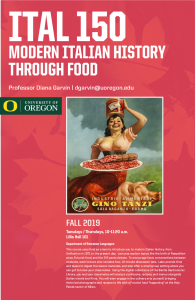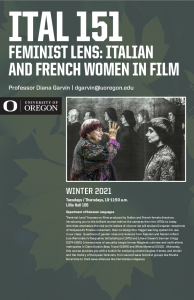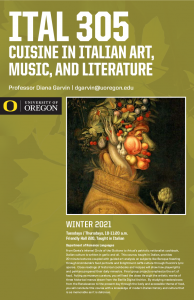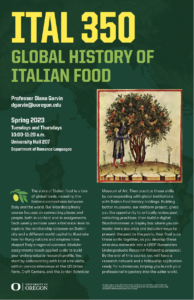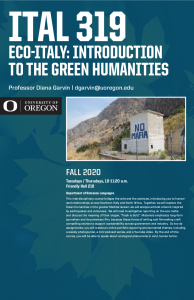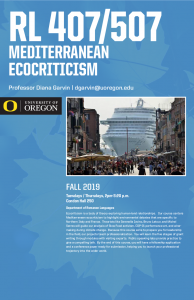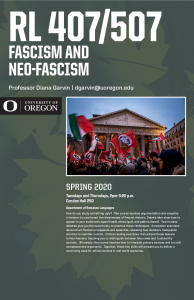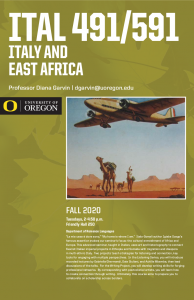Modern Italian History through Food ITAL 151
Feminist Lens: Italian and French Women in Film ITAL 305
Cuisine in Italian Art, Music, and Literature ITAL 319
Eco-Italy: Introduction to the Green Humanities ITAL 350
Global History of Italian Food RL 407/507
Mediterranean Ecocriticism RL 407/507
Fascism and Neo-Fascism ITAL 491/591
Italy and East Africa
Modern Italian History through Food
ITAL 150: Modern Italian History through Food
This course uses food as a lens to introduce you to modern Italian history, from Unification in 1871 to the present day. Lectures explore topics like the birth of Neapolitan pizza, Futurist food, and the G-8 pesto debate.
To encourage lively conversations between students, each lecture also includes four, 10-minute discussion labs. Labs provide time and space to digest the lesson materials, and also offer a small-group setting where you can get to know your classmates. Using the digital collections of the Barilla Gastronomic Library, you and your classmates will analyze cookbooks, recipes, and menus alongside Italian novels and films. You will even engage in the culinary arts yourself, bringing historical photographs and recipes to life with a Futurist food “happening” at the Holy Palate tavern of Milan.
Watch the Historical Cooking Show, a project by Synoah Perez, Gracie Giannecchini, Diana Williams, Rachel Couche
Feminist Lens: Italian and French Women in Film
Cuisine in Italian Art, Music, and Literature
Eco-Italy: Introduction to the Green Humanities
Global History of Italian Food
Mediterranean Ecocriticism
Fascism and Neo-Fascism
Italy and East Africa
Teaching Awards
Here at the University of Oregon, I've designed eight new courses and received four awards for my teaching.
GSL Curriculum Innovation Grant
2022 – 2023
For my course ITAL 350: Global History of Italian Food
This prize recognizes courses that teach responsibility, resilience, reinvention, and reflection, the core values of the School of Global Studies and Languages.
Sustainability Award for Excellence in Teaching
2021-2022
Fo my course ITAL 319: Eco-Italy
This prize recognizes depth of teaching around the three aspects of sustainability—environmental, social, and economic.
OHC Robert F. and Evelyn Nelson Wulf Professorship
2019 – 2020
For my course RL 407/507: Fascism and Neo-Fascism
This prize recognizes courses that identify, examine carefully, and respond critically to ethical issues that confront individuals and society.
LIFT Award
2018-2019
For my course ITAL 150: Italian History through Food
This prize recognizes courses that provide innovative paths to proficiency and inspires students to persist in second-language study.
